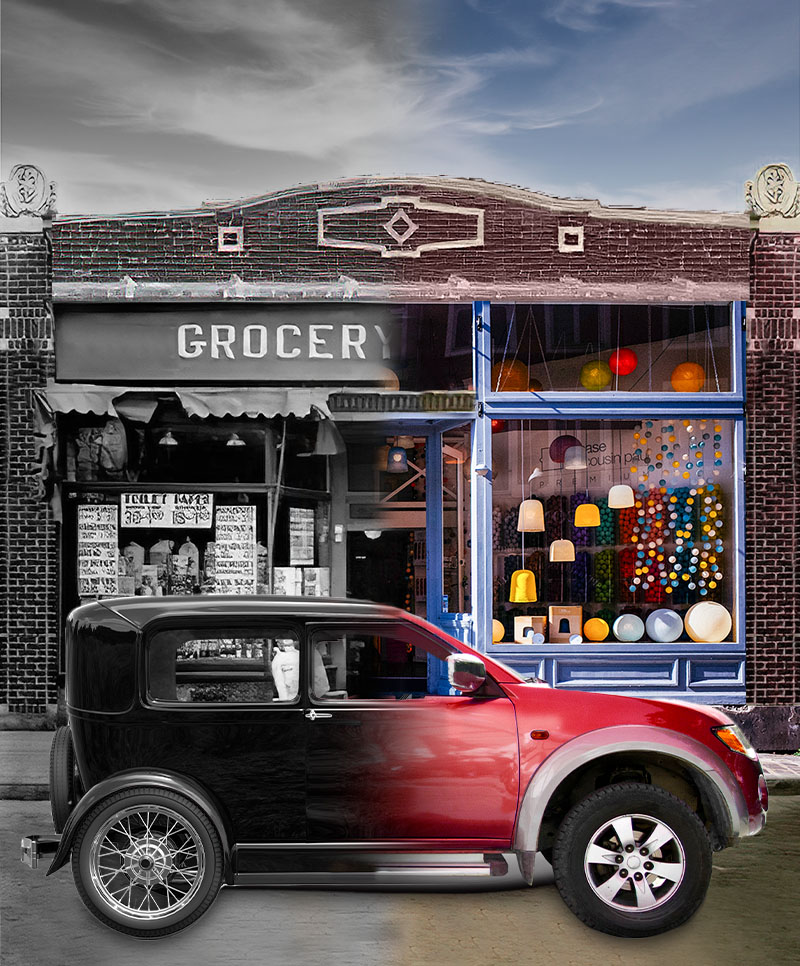I don’t remember how old I was — clearly not old enough to do the math myself — but I vividly recall having my mind blown when my mother told me that there were people still alive who had been born in the nineteenth century. This must have been in the early 1960s — a time when “a century ago” meant the Civil War and the Wild West. That such an ancient era could be so close to our own seemed unimaginable.
Sixty-or-so years have passed since then, and “a century ago” now means 1922. Could I be the only one for whom 1922 doesn’t feel nearly as remote as the Civil War? Maybe it’s because we — or at least I — routinely watch films that were made in the 1920s, but life at that time doesn’t seem much different than life now. People drove cars, talked on telephones, and had gas stoves and electric lights. They went to the office, shopped in department stores, listened to recordings, and went to the movies. Granted, making a phone call required talking to an operator, and drivers of automobiles had to share the road with the occasional horse-drawn vehicle, but all in all, if someone were to put me in a time machine and drop me off in the 1920s, I think I’d make out just fine.
Jump ahead a decade to the 1930s, and life feels even more familiar. Cars look like cars instead of horseless carriages, phones can connect to each other autonomously, kitchens are bright with white-enameled appliances, and mass media — in the form of the ubiquitous radio — has entered everyone’s home. Most important, people can suddenly talk.
To clarify, people had been blabbing for thousands of years, but in movies (which is the most direct way we have of getting to know them), characters didn’t really start talking until the end of the 1920s. I’m guessing that the fact that we can not only see people going about their lives, but hear them as well, is what makes them feel so like us.
It’s disconcerting to spend time with characters in a 1930s movie — experiencing them not as relics of another time, but as living, breathing people — and suddenly remember that the actors we’re looking at are long gone. Fred Astaire and Ginger Rogers dancing, William Powell and Myrna Loy quipping, Clark Gable and Claudette Colbert bantering — it all feels so immediate. I simply can’t adjust to the fact that the events I’m watching happened ninety years ago. Ninety years is practically a century.
I find myself wondering about the people who were my current age — in their mid-sixties, or older — in the 1960s. They would have been born around or before the turn of the twentieth century. Did the Civil War and Reconstruction feel as recent to them as the 1920s do to me? Would they have felt that if a time machine dropped them somewhere in the 1860s or ’70s, they would be in relatively familiar surroundings? Or does the absence of movies and sound recordings from that time mean that the Civil War era always felt remote to people who didn’t live through it?
I’m fairly certain that for young people today, the 1920s and ’30s do feel like the distant past — probably as distant as the era of Manifest Destiny felt to me when I was young. But I’ll bet that’s largely because they haven’t seen the films that I’ve seen. (In my experience, people under 30 refuse to watch any movie that’s in black-and-white, no matter how excellent it is.)
I developed my interest in silent films when I was still in elementary school, so I realize that I’m an anomaly even in my own generation. But I’d love to find a present-day me-equivalent — someone young who has watched a lot of classic films — and find out what their relationship is to the America of a hundred years ago. Does a century feel as short to them as it does to me?

Recent Comments